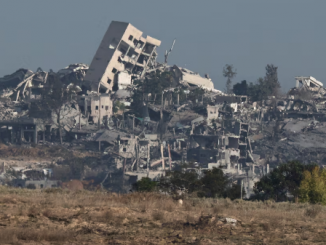
RAWA, CC BY 3.0 <https://creativecommons.org/licenses/by/3.0>, via Wikimedia Commons
| Published August 7, 2025
🌍 Global Terrorism Context
-
As of 2023, terrorism deaths declined globally by about 9%, although this was uneven across regions. Outside Afghanistan, deaths actually rose by 4% in conflict‑affected areas.
-
The Sahel region remains the epicenter of jihadist violence, accounting for nearly half of all terrorism‑related deaths.
📉 Economic Impacts of Terrorism
-
Terrorism causes direct destruction of infrastructure, deters investment, and raises operational costs for businesses—including insurance and tourism—resulting in slower growth.
-
Broader systemic effects include political instability, higher security spending, and erosion of trust—especially in democracies, where growing terrorist activity can worsen income inequality.
🧠 Psychological & Institutional Effects
-
Major economic trauma from terrorism can lower public trust and suppress creativity and freedom, although counterintuitively, some studies observe temporary upticks in household income and economic output afterward—possibly due to mobilized institutional responses.
🧮 On Technological Regression Claims
-
The original Gateway Pundit article claims jihadist extremism can reverse entire societies to 19th‑century literacy and education levels, a sweeping narrative unsupported by mainstream research.
-
Leading terrorism and economic indexes, including independent longitudinal studies, find no evidence of widespread “technological regression”, only region‑specific disruption and instability
📌 Editorial Insight
While terrorism indeed impairs economic growth, infrastructure stability, and human capital development, there’s no credible evidence that extremist groups systematically reverse modern technological progress. Rather, disruptions are localized—often mitigated over time by state responses, rebuilding, and international support.
Analysts caution against simplistic narratives that amplify ideology over data. Policy should instead focus on root causes, resilient institutions, and context‑specific interventions capable of supporting stability without conflating diverse threats under a monolithic frame.
✅ What Do Independent, Credible Sources Say?
📉 Global Terrorism Trends
-
According to the Global Terrorism Index (2025), overall terrorism deaths declined by 13% in 2024, largely due to a drop in activity in Myanmar. Excluding that outlier, global terrorist attacks rose 8%.
-
The Islamic State and its affiliates remained the deadliest terrorist group globally in 2024, despite the loss of its territorial “caliphate” in Iraq and Syria.
-
In the Sahel, groups like JNIM and IS-linked affiliates have expanded influence amid state collapse, seizing territory, taxing civilians, and delivering rudimentary governance—deepening instability rather than showing evidence of broad technological regression.
⚙️ Economics of Terrorism
-
Scholar Eli Berman has framed terrorist organizations like ISIS, al‑Qaeda, Hezbollah, Hamas, and the Taliban as structurally robust due to effective internal social services and organizational discipline—not necessarily due to ideological strength alone.
-
Economic studies suggest that terrorism impacts broader economic expectations, investment decisions, and educational outcomes—but mostly through disruptions, not direct forced reversals of technological progress.
 Implications as Presented in the Article
Implications as Presented in the Article
-
Extremist Ideologies Reverse Technological and Economic Progress
The article implies that jihadist terrorism directly causes a backward slide in development, leading to regression in education, healthcare, innovation, and infrastructure. -
Ideological Suppression Replaces Rational Policy
The author warns that global institutions and Western governments downplay the jihadist threat due to political correctness or ideological bias, which leads to policy blindness and weak national security responses. -
Need for “Objective Truth” in Economic Policy and Security Analysis
The article calls for what it claims is a return to rational, fact-based assessments — implying that mainstream discourse is distorted by cultural sensitivity, media narratives, or political agendas.
🌐 Real-World Implications (Broader Context & Concerns)
1. ⚠️ Oversimplification of Terrorism’s Impact Risks Bad Policy
-
The article makes a sweeping generalization that all jihadist extremism leads to “technological regression.”
-
In truth, terrorism affects development unevenly, depending on the region, local governance, and preexisting conditions.
-
Policy risk: Using such generalizations in policymaking can lead to:
-
Over-securitization
-
Misallocation of aid
-
Neglect of root causes (poverty, governance failure, ethnic conflict)
-
2. 🧨 Stigmatizing Specific Groups Can Fuel More Extremism
-
The article frames the issue in civilizational or religious terms — potentially increasing polarization.
-
Implication: It can alienate Muslim communities globally, which is counterproductive to counterterrorism efforts that rely on trust and cooperation with local populations.
3. 🧠 Pushing “Objective Truth” Narratives Without Academic Rigor Creates Echo Chambers
-
While the phrase “objective truth” sounds scientific, the article does not cite peer-reviewed sources or present quantitative economic models.
-
Implication: It may reinforce echo chambers that confirm biases rather than foster informed debate.
4. 📰 Trust in Information Ecosystems Continues to Fracture
-
Publishing this type of analysis in a politically polarizing outlet (The Gateway Pundit) rather than a peer-reviewed economic journal means:
-
It lacks scholarly vetting
-
Readers may confuse opinion with empirical truth
-
-
Implication: Further erosion of trust in media, academia, and policy institutions.
 Overall Takeaway:
Overall Takeaway:
While the article attempts to present a bold economic argument linking jihadist extremism to technological and societal decline, its sweeping claims lack academic rigor and rely on ideological framing rather than evidence-based analysis. The broader real-world implications of such narratives are significant: they risk oversimplifying complex geopolitical realities, fueling stigmatization, and undermining credible policy-making.
Framing terrorism solely through the lens of technological regression overlooks the nuanced socioeconomic, historical, and political conditions that shape both extremism and development. Furthermore, promoting the idea of “objective truth” through politically charged platforms may deepen polarization and erode public trust in legitimate scholarship and governance.
In addressing global extremism, what is truly needed is not rhetorical certainty, but thoughtful, evidence-driven solutions that address root causes and respect the diversity of global experiences.




